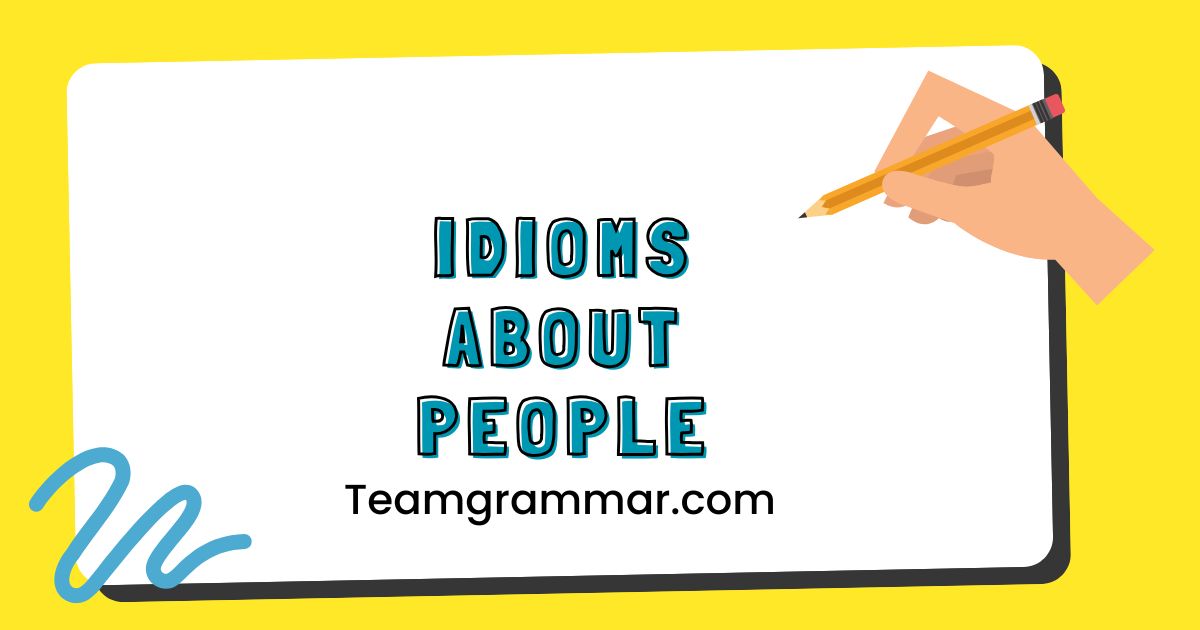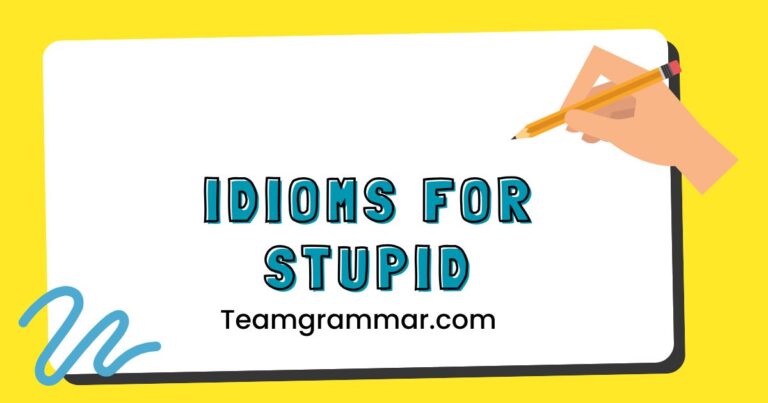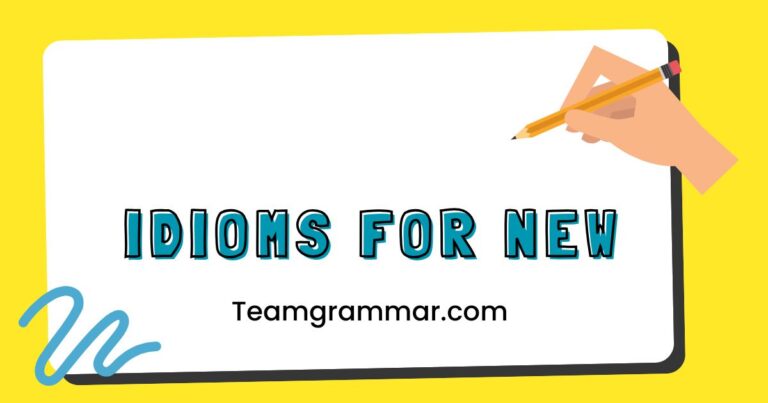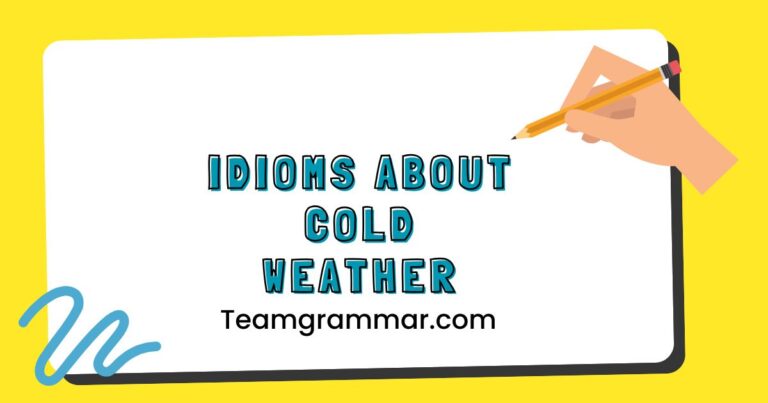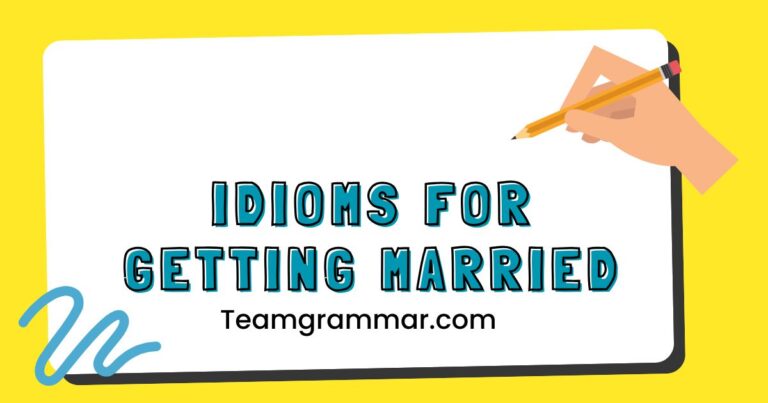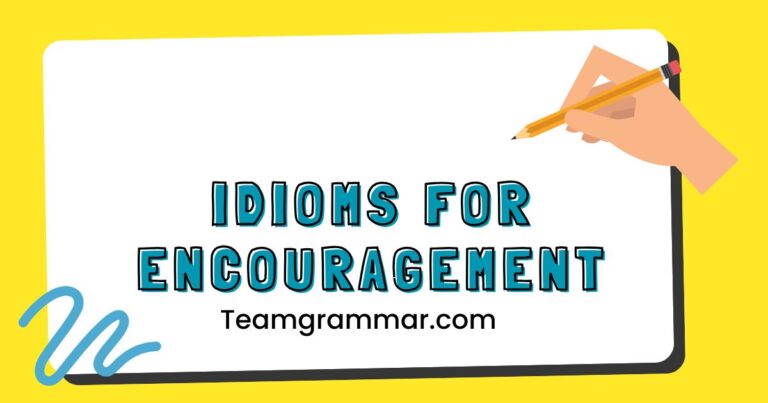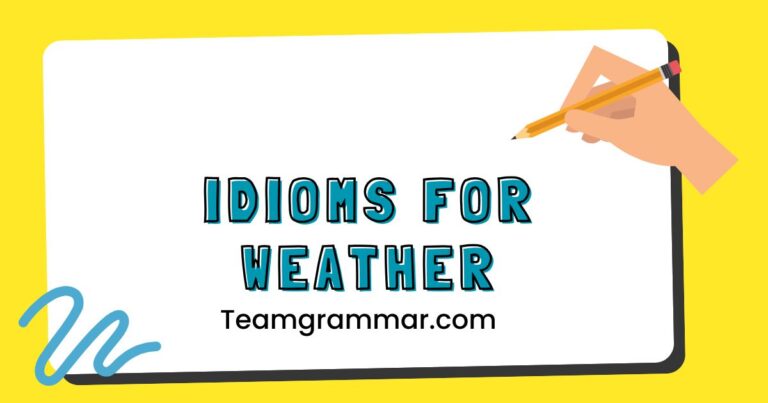43 Idioms About People: Understanding Common Expressions
Idioms add color and depth to the English language, making communication more engaging and nuanced. Understanding idioms, especially those describing people, is crucial for effective communication and comprehension.
These expressions often convey complex meanings in a concise and memorable way. This article will explore a wide range of idioms about people, providing definitions, examples, and usage rules to help you master them.
This guide is perfect for English language learners, teachers, and anyone looking to enhance their understanding of idiomatic expressions.
By familiarizing yourself with these idioms, you’ll not only improve your comprehension of spoken and written English but also enhance your ability to express yourself more creatively and accurately. This comprehensive guide will break down different categories of idioms, offer clear examples, and provide practical exercises to solidify your understanding.
Let’s dive in and explore the fascinating world of idioms about people!
Table of Contents
- Introduction
- Definition of Idioms About People
- Structural Breakdown of Idioms
- Types and Categories of Idioms About People
- Examples of Idioms About People
- Usage Rules for Idioms About People
- Common Mistakes When Using Idioms
- Practice Exercises
- Advanced Topics in Idioms
- Frequently Asked Questions (FAQ)
- Conclusion
Definition of Idioms About People
An idiom is a phrase or expression whose meaning cannot be understood from the ordinary meanings of the individual words. In other words, it’s a saying that has a figurative meaning different from its literal meaning.
Idioms about people are those that specifically describe a person’s character, behavior, intelligence, or other attributes. These idioms often provide a more colorful and descriptive way to talk about someone than using straightforward adjectives.
Idioms can be classified based on their function and the context in which they are used. Some idioms are descriptive, offering insight into a person’s traits or habits.
Others are evaluative, expressing a judgment or opinion about someone. Understanding the context in which an idiom is used is crucial to interpreting its intended meaning accurately.
The function of an idiom often depends on the situation and the speaker’s intent.
The context of an idiom can drastically alter its impact and interpretation. For example, an idiom that is complimentary in one context might be sarcastic in another.
Therefore, it’s essential to consider the tone of the conversation, the relationship between the speakers, and the overall situation when interpreting idioms about people. A deep understanding of context is key to mastering idioms and using them effectively.
Structural Breakdown of Idioms
Idioms, by their nature, defy simple structural analysis because their meaning is not derived from the literal meanings of their component words. However, we can still examine the structural elements that commonly appear in idioms about people.
Many idioms follow specific patterns, such as using similes (like a…) or metaphors (is a…). Understanding these patterns can help you recognize and interpret new idioms.
Common structural elements include verbs, nouns, and adjectives combined in unique ways. For example, the idiom “to have a heart of gold” uses the verb “to have,” the noun “heart,” and the adjective “gold” to describe someone’s kindness.
The structure is simple, but the meaning is figurative. Identifying these core components can aid in understanding the idiom’s overall meaning and usage.
Idioms often contain figurative language, such as metaphors, similes, and personification. A metaphor directly compares two unlike things, while a simile uses “like” or “as” to make a comparison.
Personification gives human qualities to non-human entities. Recognizing these figures of speech within idioms can provide clues to their intended meaning.
For example, “as cool as a cucumber” uses a simile to describe someone who is calm and composed.
Types and Categories of Idioms About People
Idioms about people can be categorized based on the aspect of a person they describe. This categorization helps in understanding and remembering the idioms more effectively.
Here are some common categories:
Idioms Describing Intelligence
These idioms describe a person’s mental capacity, knowledge, or wisdom. They can range from complimentary to derogatory, depending on the specific idiom.
Idioms Describing Personality
These idioms characterize a person’s general nature, temperament, or disposition. They often reflect the person’s typical behavior or emotional state.
Idioms Describing Behavior
These idioms focus on a person’s actions, habits, or conduct. They can describe both positive and negative behaviors.
Idioms Describing Skill
These idioms highlight a person’s abilities, talents, or expertise in a particular area. They often emphasize competence or proficiency.
Idioms Describing Appearance
These idioms describe a person’s physical looks or outward presentation. They can be complimentary, critical, or simply descriptive.
Examples of Idioms About People
To better understand idioms about people, let’s explore examples categorized by the aspects of a person they describe. Each category will be presented with a table of examples, definitions, and example sentences.
Examples of Idioms Describing Intelligence
The following table provides idioms that describe a person’s intelligence, ranging from cleverness to foolishness. Each idiom is defined, and an example sentence is provided to illustrate its usage.
| Idiom | Definition | Example Sentence |
|---|---|---|
| Sharp as a tack | Very intelligent and quick-witted. | She’s as sharp as a tack; she always understands complex problems instantly. |
| Not the sharpest tool in the shed | Not very intelligent. | He’s a nice guy, but he’s not the sharpest tool in the shed. |
| Brainy | Very intelligent; clever. | She’s a brainy student who always gets top marks. |
| Bookworm | Someone who spends a great deal of time reading. | He’s such a bookworm; he spends all his free time in the library. |
| Quick on the uptake | Understanding things quickly. | She’s very quick on the uptake and learns new skills easily. |
| Slow on the uptake | Understanding things slowly. | He’s a bit slow on the uptake, so you need to explain things carefully. |
| A bright spark | An intelligent and lively person. | She’s a bright spark in the team, always coming up with new ideas. |
| Wise owl | Someone who is very wise and knowledgeable. | He’s a wise owl when it comes to financial matters. |
| Street smart | Having the knowledge and experience to deal with the potential difficulties or dangers of life in an urban environment. | He may not have a formal education, but he’s street smart and knows how to handle tough situations. |
| A walking encyclopedia | Someone who knows a lot about a wide range of subjects. | She’s a walking encyclopedia; you can ask her anything, and she’ll know the answer. |
| Knows their stuff | To be knowledgeable about a particular subject. | He really knows his stuff when it comes to computer programming. |
| Has a good head on their shoulders | To be intelligent and sensible. | She has a good head on her shoulders and always makes wise decisions. |
| Not the brightest bulb | Not very intelligent (similar to “not the sharpest tool in the shed”). | He’s a hard worker, but he’s not the brightest bulb in the box. |
| Airhead | A silly or unintelligent person. | She’s sometimes a bit of an airhead, but she has a good heart. |
| Dumb as a doornail | Extremely unintelligent. | He’s as dumb as a doornail and doesn’t understand simple concepts. |
| A genius | An exceptionally intelligent person. | She’s a genius in mathematics and can solve complex problems effortlessly. |
| A rocket scientist | An extremely intelligent person (often used sarcastically). | You don’t need to be a rocket scientist to figure out how to use this machine. |
| A smart cookie | A clever or intelligent person. | She’s a smart cookie and always finds creative solutions to problems. |
| Think outside the box | To think creatively and unconventionally. | To solve this problem, we need someone who can think outside the box. |
| Two heads are better than one | Two people working together can solve a problem more easily than one person working alone. | We’re stuck on this project, but two heads are better than one, so let’s work together. |
| Use your noodle | To use your brain; to think hard. | Come on, use your noodle and figure out the answer. |
| Scatterbrained | Disorganized and lacking concentration. | She’s a bit scatterbrained and often forgets important details. |
| Absent-minded professor | A clever person who is often forgetful or impractical. | He’s like an absent-minded professor, brilliant but always misplacing his keys. |
| A know-it-all | Someone who acts as if they know everything. | He’s such a know-it-all; he always has to show off his knowledge. |
| Not playing with a full deck | Not very intelligent or mentally stable. | I don’t think he’s playing with a full deck; he says some pretty strange things. |
| One sandwich short of a picnic | Not very intelligent or sensible. | I think she’s one sandwich short of a picnic; her ideas are a bit bizarre. |
| Not wrapped too tight | Not very intelligent or sensible. | He’s not wrapped too tight, but he’s a good-hearted person. |
Examples of Idioms Describing Personality
This table focuses on idioms that describe a person’s personality traits. It includes both positive and negative attributes, providing a comprehensive view of how idioms can be used to characterize someone’s disposition.
| Idiom | Definition | Example Sentence |
|---|---|---|
| Heart of gold | A very kind and generous person. | She has a heart of gold and is always willing to help others. |
| Cold fish | Someone who is unemotional and unfriendly. | He’s a bit of a cold fish and doesn’t show much emotion. |
| Life of the party | Someone who is lively and entertaining at social gatherings. | She’s always the life of the party and knows how to make everyone laugh. |
| Down to earth | Practical and realistic. | Despite her success, she’s very down to earth and approachable. |
| A people person | Someone who enjoys and is good at interacting with others. | She’s a real people person and excels in customer service. |
| A lone wolf | Someone who prefers to be alone and work independently. | He’s a lone wolf and prefers to work on projects by himself. |
| Tough cookie | Someone who is strong and resilient. | She’s a tough cookie and can handle any challenge. |
| A soft touch | Someone who is easily persuaded to give money or help. | He’s a soft touch and always donates to charity. |
| A drama queen | Someone who overreacts to situations. | She’s such a drama queen; she always exaggerates everything. |
| A happy camper | Someone who is content and satisfied. | He’s a happy camper with his new job and enjoys his work. |
| Wet blanket | Someone who spoils the fun of others. | Don’t be such a wet blanket; let’s have some fun! |
| Eager beaver | Someone who is very enthusiastic and hardworking. | She’s an eager beaver and always volunteers for extra tasks. |
| Good egg | A kind and reliable person. | He’s a good egg and always helps out when needed. |
| Bad egg | A dishonest or unreliable person. | I wouldn’t trust him; he’s a bad egg. |
| Grumpy Gus | Someone who is always in a bad mood. | He’s such a Grumpy Gus in the morning before he has his coffee. |
| Chatterbox | Someone who talks a lot. | She’s a chatterbox and can talk for hours on end. |
| Wallflower | Someone who is shy and doesn’t participate in social activities. | She’s a bit of a wallflower at parties and prefers to observe from the sidelines. |
| Go-getter | Someone who is ambitious and proactive. | She’s a go-getter and always strives for success. |
| Old soul | Someone who seems wise beyond their years. | She’s an old soul and has a deep understanding of life. |
| Black sheep | Someone who is different from the rest of their family or group and is often considered a disgrace. | He’s the black sheep of the family and has always gone his own way. |
| Rolling stone | Someone who doesn’t settle down in one place or job. | He’s a rolling stone and has lived in many different countries. |
| Golden boy | Someone who is very successful and popular. | He’s the golden boy of the company and is destined for great things. |
| Man of his word | Someone who keeps their promises. | He’s a man of his word and can always be trusted to do what he says. |
| Devil’s advocate | Someone who argues against a proposition to test it. | I’m just playing devil’s advocate to see if your plan holds up. |
| Ticking time bomb | Someone who is likely to explode in anger or violence. | He’s a ticking time bomb and could snap at any moment. |
| Cream of the crop | The best of a group or category. | She’s the cream of the crop when it comes to software engineers. |
Examples of Idioms Describing Behavior
This table provides idioms that describe a person’s behavior, focusing on their actions and conduct in various situations. These idioms can be used to describe both positive and negative behaviors.
| Idiom | Definition | Example Sentence |
|---|---|---|
| Always has their nose in a book | Spends a lot of time reading. | She always has her nose in a book and is very knowledgeable. |
| Plays it by ear | To improvise or decide how to proceed as things develop. | We don’t have a set plan; we’ll just play it by ear. |
| Goes the extra mile | To do more than what is expected. | She always goes the extra mile to help her students succeed. |
| Cuts corners | To do something poorly in order to save time or money. | He often cuts corners to finish projects quickly, but the quality suffers. |
| Sits on the fence | To remain neutral or undecided in a dispute. | He’s sitting on the fence and doesn’t want to take sides. |
| Stabs in the back | To betray someone’s trust. | He stabbed me in the back by spreading rumors about me. |
| Burns the candle at both ends | To work very hard and exhaust oneself. | She’s been burning the candle at both ends to meet the deadline. |
| Rubs people the wrong way | To irritate or annoy people. | He often rubs people the wrong way with his arrogant attitude. |
| Turns a blind eye | To ignore something that one knows is wrong. | The manager turned a blind eye to the employee’s misconduct. |
| Wears their heart on their sleeve | To openly display one’s emotions. | She wears her heart on her sleeve and is very expressive. |
| Keeps their cards close to their chest | To keep one’s plans or intentions secret. | He keeps his cards close to his chest and never reveals his strategies. |
| Bites off more than they can chew | To take on more than one can handle. | He bit off more than he can chew by volunteering for too many projects. |
| Sweats the small stuff | To worry about minor details. | She always sweats the small stuff and gets stressed over insignificant things. |
| Lets things slide | To allow things to deteriorate by not paying attention. | He lets things slide at work, which leads to many problems. |
| Spills the beans | To reveal a secret. | She spilled the beans about the surprise party. |
| Takes the bull by the horns | To confront a difficult situation with courage. | He took the bull by the horns and addressed the issue head-on. |
| Rings a bell | To sound familiar. | That name rings a bell, but I can’t quite remember who he is. |
| Misses the boat | To miss an opportunity. | He missed the boat by not investing in the company early on. |
| Jumps the gun | To act prematurely or without thinking. | He jumped the gun by announcing the project before it was approved. |
| Rocks the boat | To disrupt a stable situation. | She rocked the boat by questioning the company’s policies. |
| Hangs in there | To persevere or remain determined. | Hang in there; things will get better soon. |
| Goes with the flow | To adapt to circumstances. | He goes with the flow and is very flexible. |
| Calls the shots | To be in charge or make decisions. | She calls the shots in the company and makes all the important decisions. |
| Pulls strings | To use influence to get something done. | He pulled some strings to get his son an internship. |
| Backs down | To withdraw from a confrontation or argument. | He always backs down when challenged. |
| Plays hardball | To be ruthless in negotiations. | She plays hardball when negotiating contracts. |
Examples of Idioms Describing Skill
This table showcases idioms that describe a person’s skill or talent in a particular area. These idioms highlight competence, expertise, or proficiency in various domains.
| Idiom | Definition | Example Sentence |
|---|---|---|
| Has a knack for | To have a natural talent or ability for something. | She has a knack for languages and learns them quickly. |
| A natural | Someone who is naturally good at something. | He’s a natural at playing the piano. |
| Green thumb | Skill in gardening. | She has a green thumb and can grow anything. |
| Knows the ropes | To be familiar with the details of a job or task. | He knows the ropes and can handle any situation. |
| A whiz | Someone who is very skilled or knowledgeable. | She’s a whiz at computer programming. |
| Handy | Skilled at doing practical tasks. | He’s very handy and can fix anything around the house. |
| A dab hand | Someone who is very skilled at something. | She’s a dab hand at cooking and makes delicious meals. |
| Has an ear for music | To have a natural talent for music. | He has an ear for music and can play any instrument. |
| Quick study | Someone who learns quickly. | She’s a quick study and picks up new skills easily. |
| A smooth operator | Someone who is skilled at getting what they want. | He’s a smooth operator and always gets the best deals. |
| An old hand | Someone with a lot of experience. | He’s an old hand at this job and knows it inside out. |
| Learns by leaps and bounds | To make rapid progress in learning. | She’s learning by leaps and bounds and is improving quickly. |
| Gift of the gab | The ability to speak persuasively. | He has the gift of the gab and can convince anyone of anything. |
| Has a way with words | To be skilled at using language effectively. | She has a way with words and can write beautifully. |
| A master of | Someone who is highly skilled in a particular area. | He’s a master of negotiation and always gets the best results. |
| A pro | Someone who is highly skilled in a particular area. | She’s a pro at playing tennis and wins every match. |
| Top-notch | Of the highest quality or skill. | He’s a top-notch chef and creates amazing dishes. |
| Second to none | The best; unsurpassed. | Her skills are second to none and she’s the best in the field. |
| Talented | Having a natural aptitude or skill for something. | She’s a talented artist and creates beautiful paintings. |
| Adept at | Very skilled or proficient at something. | He’s adept at solving complex problems. |
Examples of Idioms Describing Appearance
This table presents idioms that describe a person’s physical appearance. These idioms can be complimentary, critical, or simply descriptive, offering a colorful way to depict someone’s looks.
| Idiom | Definition | Example Sentence |
|---|---|---|
| As pretty as a picture | Very attractive. | She looks as pretty as a picture in her wedding dress. |
| Easy on the eye | Pleasing to look at. | He’s very easy on the eye and attracts a lot of attention. |
| A sight for sore eyes | Someone or something that is very welcome to see. | After a long day at work, seeing my family is a sight for sore eyes. |
| All skin and bones | Very thin and underweight. | After being sick, he was all skin and bones. |
| A face that launched a thousand ships | An exceptionally beautiful face. | She has a face that launched a thousand ships and is incredibly beautiful. |
| Looks like death warmed up | Looking very ill or tired. | He looks like death warmed up; he needs to get some rest. |
| In the bloom of youth | At the peak of one’s physical attractiveness and vitality. | She’s in the bloom of youth and full of energy. |
| Long in the tooth | Old or aging. | He’s getting a bit long in the tooth to be playing professional sports. |
| Young at heart | Having a youthful spirit despite being old. | She’s young at heart and enjoys life to the fullest. |
| A baby face | A face that looks young for one’s age. | He has a baby face and often gets mistaken for a teenager. |
| As fit as a fiddle | In excellent physical condition. | He’s as fit as a fiddle and exercises every day. |
| Has a glow about them | To appear healthy and radiant. | She has a glow about her and looks very happy. |
| Dressed to kill | Wearing very stylish or attractive clothes. | She’s dressed to kill for the party tonight. |
| Looking sharp | Looking stylish and well-dressed. | He’s looking sharp in his new suit. |
| Plain Jane | An ordinary-looking woman. | She’s a bit of a Plain Jane but has a great personality. |
| Man about town | A fashionable and socially active man. | He’s a man about town and always knows the latest trends. |
| A diamond in the rough | Someone who has potential but needs refinement. | He’s a diamond in the rough and has a lot of potential. |
| Turning heads | Attracting attention because of one’s appearance. | She’s turning heads wherever she goes with her stunning looks. |
| As alike as two peas in a pod | Very similar in appearance. | They’re as alike as two peas in a pod and often get mistaken for each other. |
Usage Rules for Idioms About People
Using idioms correctly requires understanding their specific meanings and contexts. Here are some general rules to follow:
- Context is Key: Always consider the context in which the idiom is used. The same idiom can have different meanings depending on the situation.
- Audience Awareness: Be mindful of your audience. Some idioms may not be appropriate for formal settings or certain cultural backgrounds.
- Grammatical Structure: Maintain the correct grammatical structure of the idiom. Altering the words can change the meaning or make it nonsensical.
- Figurative Meaning: Remember that idioms have a figurative meaning that is different from the literal meaning of the words.
- Practice: The best way to learn idioms is through practice. Read widely and listen to native speakers to become familiar with their usage.
It’s also important to note that some idioms are more common in certain regions or dialects. Be aware of these regional variations and use idioms that are appropriate for your audience.
Overusing idioms can also make your speech sound unnatural or forced. Use them sparingly and appropriately to enhance your communication.
When in doubt, it’s always better to use plain language rather than an idiom you’re not completely sure about. Misusing an idiom can lead to confusion or miscommunication.
Pay attention to how native speakers use idioms and try to emulate their usage. With practice and attention to detail, you can master the art of using idioms effectively.
Common Mistakes When Using Idioms
One of the most common mistakes is interpreting idioms literally. Since idioms have a figurative meaning, understanding the intended message is crucial.
Another frequent error is altering the words of an idiom, which can change its meaning or make it incomprehensible. It’s important to use the idiom exactly as it is.
Another mistake is using idioms in inappropriate contexts. Some idioms are too informal for professional settings, while others may be offensive in certain cultural contexts.
Always consider your audience and the situation before using an idiom. Overusing idioms can also make your speech sound unnatural or forced.
Here are some examples of common mistakes and how to correct them:
| Incorrect | Correct | Explanation |
|---|---|---|
| He has a gold heart. | He has a heart of gold. | The correct idiom is “heart of gold,” not “gold heart.” |
| She is the party of the life. | She is the life of the party. | The correct idiom is “life of the party,” not “party of the life.” |
| He is under the weather. | He is feeling under the weather. | While both can be understood, the second one is more natural. |
| She cutted corners on the project. | She cut corners on the project. | The past tense of “cut” is “cut,” not “cutted.” |
Practice Exercises
To reinforce your understanding of idioms about people, try these practice exercises. Each exercise focuses on different aspects of idiom usage, from filling in the blanks to constructing sentences.
Exercise 1: Fill in the Blanks
Complete the following sentences with the appropriate idiom from the list below.
List of Idioms: heart of gold, not the sharpest tool in the shed, life of the party, down to earth, a people person
| Question | Answer |
|---|---|
| 1. She is always | |
| 2. Despite his wealth, he remains very __________ and approachable. | |
| 3. He’s a good guy, but he’s __________ . | |
| 4. She has a __________ and is always helping others. | |
| 5. As a sales representative, he needs to be __________ . |
Answers: 1. life of the party, 2. down to earth, 3. not the sharpest tool in the shed, 4. heart of gold, 5. a people person
Exercise 2: Matching
Match the idiom with its correct definition.
| Idiom | Definition |
|---|---|
| 1. Cold fish | A. Someone who is very enthusiastic and hardworking. |
| 2. Eager beaver | B. Someone who spoils the fun of others. |
| 3. Wet blanket | C. Someone who is unemotional and unfriendly. |
Answers: 1-C, 2-A, 3-B
Exercise 3: Sentence Construction
Create a sentence using each of the following idioms.
- Think outside the box
- Take the bull by the horns
- Miss the boat
Example Answers:
- To come up with a truly innovative solution, we need to think outside the box.
- Faced with a challenging situation, she decided to take the bull by the horns and confront the issue directly.
- He missed the boat by not investing in that promising startup when he had the chance.
Advanced Topics in Idioms
For advanced learners, exploring the etymology and cultural context of idioms can provide a deeper understanding. Many idioms have historical roots or are derived from specific cultural practices.
Understanding these origins can add layers of meaning and appreciation.
Additionally, studying the use of idioms in literature and media can enhance your comprehension and ability to interpret nuanced language. Authors and speakers often use idioms creatively to convey complex ideas or evoke specific emotions.
Analyzing these usages can improve your overall language skills.
Another advanced topic is the creation of new idioms. Language is constantly evolving, and new idioms emerge over time.
Understanding the mechanisms by which idioms are created and spread can provide insights into the dynamic nature of language. This involves observing how new expressions gain figurative meanings and become widely adopted.
Frequently Asked Questions (FAQ)
Conclusion
Mastering idioms about people is a valuable skill that enhances your understanding of the English language and improves your ability to communicate effectively. By familiarizing yourself with different categories of idioms, understanding their usage rules, and practicing regularly, you can confidently incorporate these colorful expressions into your speech and writing.
Remember that idioms are not just about memorizing phrases; they are about understanding the cultural context and figurative meanings behind them. Continue to explore new idioms, pay attention to how native speakers use them, and don’t be afraid to experiment with your own usage.
With time and practice, you’ll become fluent in the language of idioms and enrich your communication skills.

